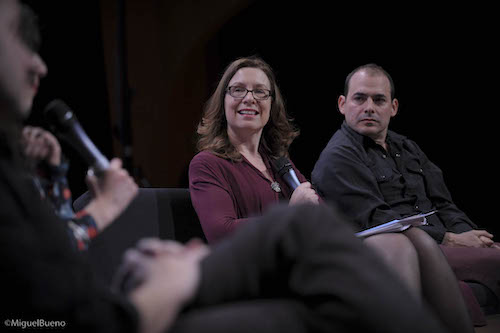
Photo: Miguel Bueno, Human Rights Film Festival
By Claire Doole, Claire Doole Communications
In everyday conversation, we often lead up to the point we want to make but when we are taking questions after a presentation, in a job or media interview then we want to do exactly the opposite!
Why is this? Because we want to be clear and concise and show with confidence we know the answer. And in a live broadcast interview, if the journalist suspects you are avoiding the question, they will interrupt and ask why you are not answering the question. So your reputation depends on getting to the point quickly.
Recently I watched some pre-recorded interviews done by CNN Money in Switzerland. As the Geneva Conventions turn 70, the programme asked whether this is a cause for celebration or concern? The reporter did 3 interviews with experts on whether the Conventions on respecting the rules of war are still relevant.
They illustrate 3 different ways of answering a question. Which one do you think is most effective?
Leading up to the answer
Lindsey Cameron ICRC and Claire Doole Communications
It takes the interviewee 45 seconds before she answers the question on whether the Conventions are still relevant. And by the way, she doesn't need to say they are not respected unless specifically asked as this opens her up to a potentially negative follow-up question.
In the second question on whether the Conventions should be broadened, she introduces too many ideas in a very long answer at nearly 2 minutes. If you go over 1 minute as a rule of thumb, you are normally not sticking to the point and in danger of rambling, making it difficult for the journalist and, most importantly, the audience to follow you.
In the third and fourth questions she is much better because she answers the questions directly on whether Geneva will remain a humanitarian epicenter.
Leading up to the answer is often the default position of academics, lawyers and scientists as they are trained to build their case - the why and how - before they give their conclusion
i.e. their main point. The problem with this technique is it takes too long to get to the point with the risk that your audience is moving on to another channel.
Putting the what before the how and why
When talking to the media or even writing for the media - press releases also follow this principle - you need to make your point first and then give supporting evidence.
The interviewee here does exactly that in the CNN Money interview.
Annyssa Bellal IHL and Claire Doole Communications
She follows the model I use in my media training - Point-Reason-Example- Point (PREP). A textbook example!
The third interview is a mix of leading up to and answering directly the question.
Marco Sassòli UNIGE from Claire Doole Communications
What he does well though is make clear and simple statements such as "They (The Conventions) are not ideal, but they are the best we have. However, what they are not doing
successfully is fighting terrorism." As a result, he is eminently quotable!
PREP is key
Making your point first and not leading up to it takes preparation and practice. Before you do a media or job interview prepare 3 key messages you want to get across using the PREP formula.
When asked a question if it is favorable to you then answer it directly using the formula. You will impress the interviewer with your clarity of thought, make your point clearly and
concisely and run no risk of getting interrupted!
Author's bio
 Claire is a former BBC correspondent and international spokeswoman who is passionate about helping people communicate with confidence. Since 2006, she has successfully trained hundreds of professionals in the art of presenting and public speaking, talking to the media, managing communications in a crisis, and writing for the web. In addition, she has coached C-level executives and public figures to give powerful TEDx and TED style talks in Europe and the Middle East. A Swiss and UK national, Claire trains and coaches in French and English.
Claire is a former BBC correspondent and international spokeswoman who is passionate about helping people communicate with confidence. Since 2006, she has successfully trained hundreds of professionals in the art of presenting and public speaking, talking to the media, managing communications in a crisis, and writing for the web. In addition, she has coached C-level executives and public figures to give powerful TEDx and TED style talks in Europe and the Middle East. A Swiss and UK national, Claire trains and coaches in French and English.
Claire is also a highly experienced moderator having facilitated panel discussions with government ministers, NGO activists, humanitarians and human rights specialists at major events.






